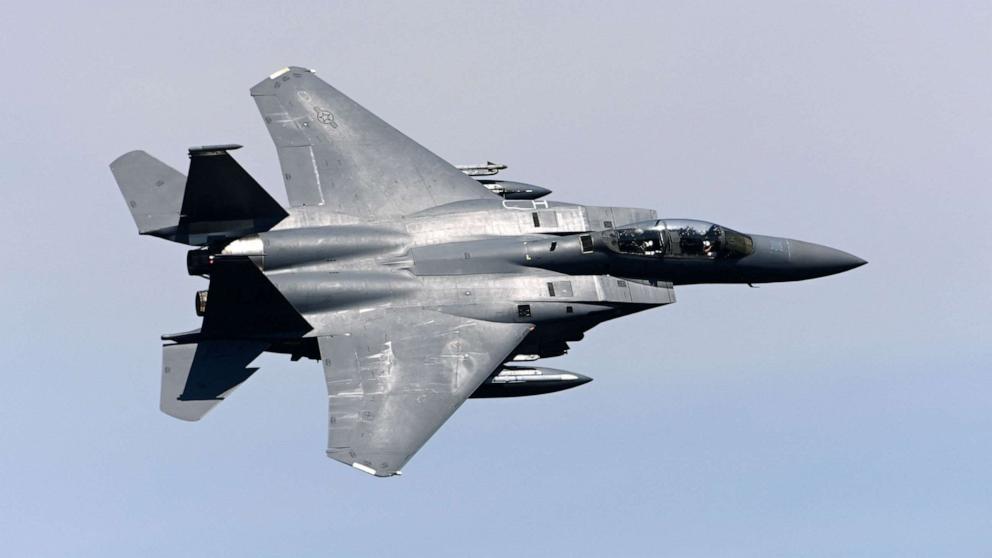


The U.S. military on Wednesday said American warplanes struck a weapons storage facility in eastern Syria that officials said was being used by Iran-backed militants responsible for dozens of drone and rocket attacks against American troops in the region over the last three weeks.
It was the second such counterstrike in the past two weeks.
"Today, at President Biden’s direction, U.S. military forces conducted a self-defense strike on a facility in eastern Syria used by Iran’s Islamic Revolutionary Guard Corps (IRGC) and affiliated groups," Defense Secretary Lloyd Austin said in a statement.
Two F-15 fighters launched precision munitions at a weapons-storage warehouse in Deir el-Zour province, according to U.S. officials.
"This precision self-defense strike is a response to a series of attacks against U.S. personnel in Iraq and Syria by IRGC-Quds Force affiliates. The President has no higher priority than the safety of U.S. personnel, and he directed today’s action to make clear that the United States will defend itself, its personnel, and its interests," Austin said.
The U.S. blames Tehran for endangering its troops, a senior defense official told reporters Wednesday night.
"We hold Iran accountable for these attacks, not just the militia groups," the official said.
MORE: US strikes back at Iranian-backed groups that attacked troops in Iraq, Syria: PentagonThe U.S. airstrikes were part of a broader messaging effort for the Iranian leadership.
"We want you to direct your proxies and militia groups to stop attacking us," the senior defense official said.
Ten days after the Hamas terror attack on Israel, Iran-backed militants began what has become a spate of near-daily aggression. Since Oct. 17, American troops have been attacked at least 41 times in the region, according to U.S. officials.
Though most of those attacks were thwarted, it wasn't from lack of trying, according to a senior military official.
The Iran-linked attackers "in all cases were taking shots at what they believed to be very large numbers of U.S. personnel with the intent of killing them," the official said Wednesday.
More than half of those attacks came after Oct. 26, when U.S. fighter jets struck two weapons and ammunition facilities in eastern Syria that officials said were used by Iran's Islamic Revolutionary Guard Corps and affiliated groups.
The senior defense official acknowledged that those strikes failed to stop the string of attacks on U.S. forces, adding that, "We just again demonstrated tonight our willingness and readiness to use military force, and no one should question the readiness of the Department of Defense with additional options to defend our forces and our interests, or President Biden's willingness to direct additional self defense strikes."
"The United States is fully prepared to take further necessary measures to protect our people and our facilities. We urge against any escalation. U.S. personnel will continue to conduct counter-ISIS missions in Iraq and Syria," Austin said in his statement.
So far, 46 U.S. service members have been identified as having signs of traumatic brain injuries, or minor wounds such as perforated eardrums, tinnitus and rolled ankles, Pentagon Press Secretary Brig. Gen. Pat Ryder told reporters Monday.
MORE: US shoots down drone in Iraq after troops targeted againMost troops have returned to duty, but two were taken to U.S. hospital facilities in Landstuhl, Germany, for further examination and care, Ryder said.
In a statement following the Oct. 26 American counterstrikes, Austin blamed the Iranian regime for the attacks on U.S. forces, and vowed further action if the aggression were to continue.
"Iran wants to hide its hand and deny its role in these attacks against our forces. We will not let them. If attacks by Iran's proxies against U.S. forces continue, we will not hesitate to take further necessary measures to protect our people," he said.
The U.S. could use its recently beefed-up military presence in the Middle East to dissuade militants from attacking, according to Mick Mulroy, former Marine, deputy assistant secretary of defense for the Middle East, and an ABC contributor.
"Part of any good defense is a good offense, and to respond to the near-constant attacks by Iranian-backed and directed groups in a manner that deters further attacks," Mulroy said.
Earlier on Wednesday, Houthi militants in Yemen, also backed by Iran, shot down an American MQ-9 Reaper drone as it flew a reconnaissance mission in international airspace, according to U.S. officials.